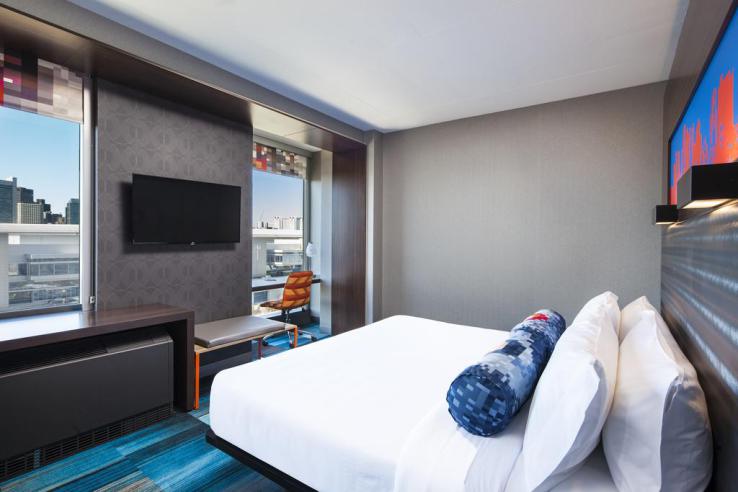

As the hotel industry wages war against Airbnb, companies making voice-powered assistants are also heading to battle in the hotel room itself.
Bloomberg reports that Amazon’s Alexa and Apple’s Siri are vying for a spot in Marriott International’s Aloft chain of hotel rooms, with both in testing at the Aloft Boston Seaport location to help inform the lodging giant’s decision.
This isn’t the first time a hotel has considered voice assistant technology — Wynn Resorts in Las Vegas installed the Amazon Echo in nearly 5,000 hotel suites back in December.
But the direct competition between Alexa and Siri shows just how critical a spot in the hotel room might be for either Amazon or Apple.
The competition over a deal with Aloft, which has 130 hotels in the U.S., with plans for 100 more, not only offers a massive corporate sale, but the opportunity to use those hotel rooms as a showroom for the technology.
Amazon, on the one hand, is no stranger to all-out ground war. The company has perfected the art of investing earnings back into infrastructure, whether it’s building warehouses, delivery drones, making movies and TV shows or going hard after the world of streaming music.
The Echo was specifically built to act as an above-average Bluetooth speaker that has built-in voice-assistant technology. But, far more importantly, it’s also Amazon’s entry point into the smart home. Echo is cheap enough to buy for the speaker functionality alone, after which point users inevitably end up trying out the voice assistant.
As more and more people adopt the Echo, Amazon in turn gets more data about their customers and offers their own closed portal through which users can access Amazon services and products sold on the platform.
So it goes without saying that Amazon would appreciate the chance to have Alexa serve the guests of various hotel chains.
On the side of Apple, Siri itself needs less of a test run than the Echo. No matter how tech-forward you are, you likely know what Siri is and how it works.
But Apple is all about that upgrade. The challenge for Apple isn’t getting you to buy an iPhone or an iPad, but rather that you get a new iPhone or iPad each time it comes out. And secondly, that you trust Siri to get the job done the first time that you ask, which wasn’t necessarily the case when Siri first launched in 2011.
But in 2014, Apple started to focus on Siri, and thoroughly upgraded the voice assistant to be smarter, easier to use and better integrated with third-party devices. And with those improvements over the last few years, it would be easy to argue that Siri could be one of Apple’s biggest selling points.
A Siri-enabled iPad in your hotel room (which could control the lights or call you an Uber) might be a great way to upsell existing customers to new hardware or upgrade to new software. Plus, it should instill some faith in Siri.
And let’s not forget Android users who might be using the technology for the first time.
In the case of both companies, a hotel room provides an excellent showroom experience in that it doesn’t require any early set-up from the perspective of the guest. What is usually the most frustrating or tedious part of using a voice assistant (especially in conjunction with other third-party devices like a smart thermostat or smart light bulbs) is altogether hidden from the user, instead only showing them all the wonder that might be.
According to the Bloomberg report, it’s unclear if hotel guests will be able to log in to their own accounts on these voice-assistant devices, or rather have access to a clearly defined set of hotel-pre-approved skills.
Luckily, this type of technology should offer a relatively short learning curve for guests who are unfamiliar with Siri or Alexa, as all you really have to do is start talking.
Apple’s Siri has far more support for other languages, while Alexa has broader integration support across third-party services. Meanwhile, the cost of a Siri-enabled device, like an iPad or iPhone, is higher than that of an Amazon Echo.
It’s a tough choice.
A win at the Aloft chains this summer could spell a much bigger win later on, as Marriott’s Toni Stoeckl said that the company uses Aloft as a sort of tech incubator to better understand what might work across Marriott’s whole portfolio of hotels.
Which begs the question: Where is Google Home in all of this?

